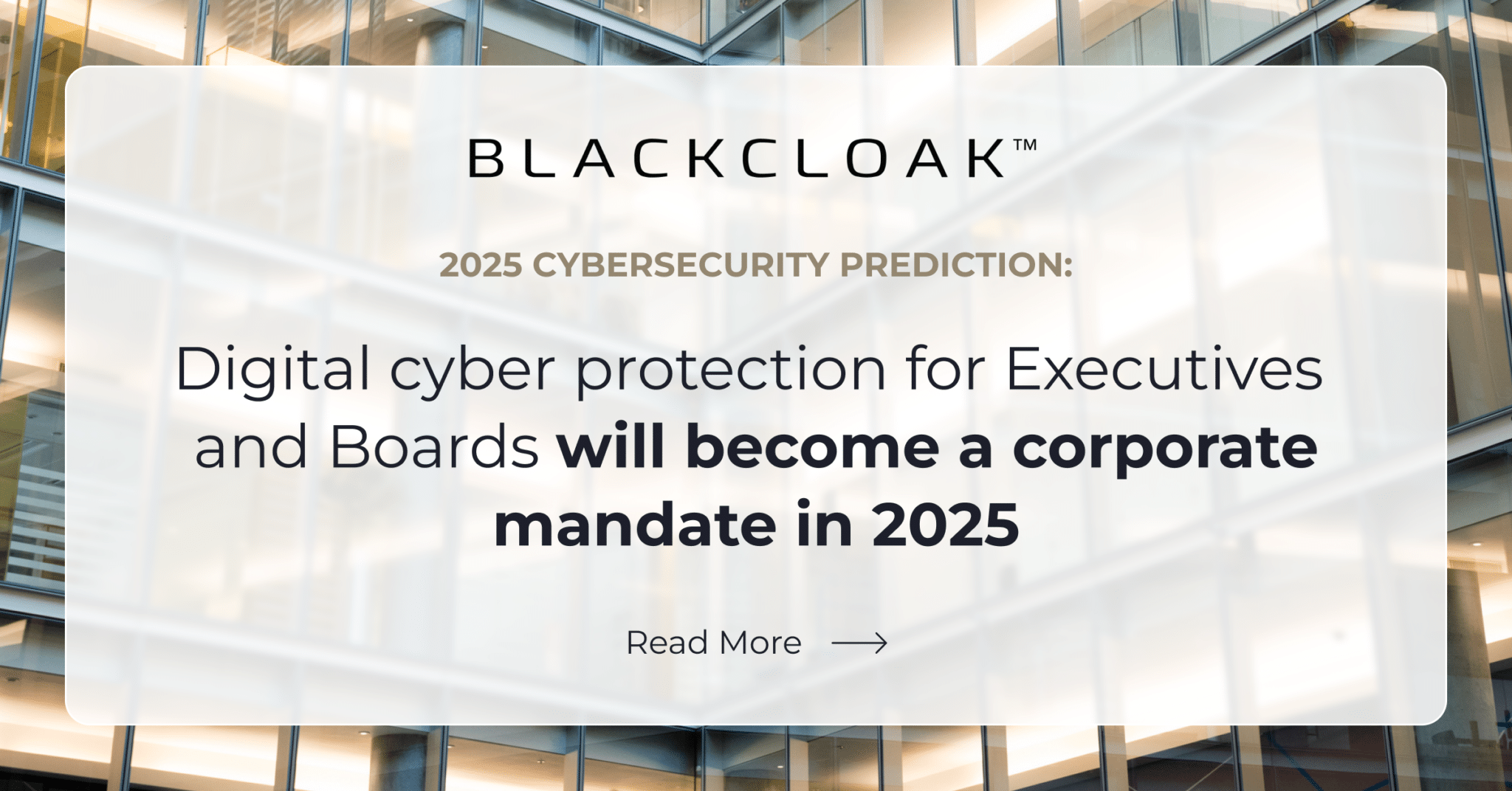2025 Prediction 5: Digital Cyber Protection For Executives And Boards Will Become A Corporate Mandate

On January 7, we published a press release to share our five predictions for cybersecurity in 2025. Over the next few weeks, we’ll publish a blog series that provides additional commentary on each prediction. This is the second blog in the series. Check out the first, second, third, and fourth blogs here.
Prediction Key Takeaways:
- Digital cyber protection for executives and boards of directors will become a corporate mandate in 2025. This mandate reflects the growing awareness of these individuals as critical targets in cybersecurity due to having access to highly sensitive corporate information – and their personal devices, communications, and digital behaviors can become entry points for sophisticated cyberattacks.
- Personal and professional digital lives have become increasingly intertwined, exposing corporations to significant vulnerabilities and costing them millions in cybersecurity breaches and operational disruptions. Threat actors across the spectrum are actively exploiting this expanded attack surface, making the personal protection of executives and senior leadership teams’ digital lives no longer optional—it is now a critical ‘must-have’ for modern corporate security programs.
- We have seen a significant increase in attacks on corporate executives, from doxxing to swatting, spear phishing, and now AI-generated deepfake impersonations. These threats will continue to extend beyond cybersecurity as these methods allow the extraction of profiling information used in planning physical attacks.
The rising tide of cyber attacks against high-net-worth individuals and family offices reflects a simple but concerning reality: cybercriminals go where the money is. What makes wealthy individuals particularly vulnerable is a combination of several factors. Their public status often means more personal details are accessible to potential attackers, and their complex financial lives – typically involving multiple accounts, properties, and business interests – create numerous potential entry points for cybercriminals.
The Rising Cyber Threat Against Family Offices
 In a 2024 Family Office Cybersecurity Report by Deloitte, 43% of surveyed family offices had experienced a cyber attack in the prior 2 years. Family offices, which manage the wealth of high-net-worth individuals and their families, are custodians of sensitive financial and personal information. This data is extremely valuable on the dark web, where it can be sold or exploited for identity theft, fraud, or other illicit activities.
In a 2024 Family Office Cybersecurity Report by Deloitte, 43% of surveyed family offices had experienced a cyber attack in the prior 2 years. Family offices, which manage the wealth of high-net-worth individuals and their families, are custodians of sensitive financial and personal information. This data is extremely valuable on the dark web, where it can be sold or exploited for identity theft, fraud, or other illicit activities.
At the same time, the majority of these family offices still lack a cybersecurity plan. Adding to their vulnerability is what security experts call a “security paradox”—while these individuals and family offices represent high-value targets, they often lack the robust security infrastructure that major corporations maintain, making them more susceptible to sophisticated cyber attacks. Wealthy individuals typically have extensive digital footprints, with their personal information often scattered across various platforms and media outlets. In addition, younger generations of rich people are active on social media platforms, which provides yet another cyber risk entry point.
Many wealthy individuals travel frequently or maintain multiple residences across various regions. Cybercriminals can track this mobility to plan attacks, such as waiting until the individual is traveling to target their homes or digital accounts or intercepting communications and data while the person is abroad. Furthermore, within their homes, they have set up “smart” homes or offices equipped with Internet of Things (IoT) devices—things like connected security cameras, voice assistants, and home automation systems. These devices can be vulnerable if not properly secured, and cyber criminals are increasingly targeting them to infiltrate personal or business networks.
A significant potential liability for HNWI stems from their complex financial ecosystems. The lack of centralized wealth management can make cyber attacks easier; having a broad network of people who manage wealth creates multiple potential entry points for hackers. While necessary for diversification, this decentralized approach to wealth management inadvertently creates numerous vulnerabilities that cybercriminals can exploit. Another consideration is that it has become more common for HNWI and wealth management firms to invest in cryptocurrency and other digital assets to diversify their portfolios. Cryptocurrency is especially attractive to cyber criminals, on these types of assets as targets.
The Specific Cyberattacks Targeting Family Offices for HNWI
Attack sophistication has also evolved specifically for family offices. Cybercriminals now employ highly refined techniques targeting family offices and wealthy individuals, often using well-designed and thoroughly researched attacks. These can include specialized forms of phishing known as “whaling” attacks, which are precisely targeted at high-net-worth individuals.
Common tactics include spear-phishing emails that appear to be from trusted sources, making them particularly effective against wealthy individuals who regularly deal with multiple financial advisors, lawyers, and other professional services. Due to their busy lifestyles and the sheer volume of transactions they manage, wealthy individuals or family offices may need to scrutinize each transaction or business deal enough, leaving opportunities for cybercriminals to exploit weaknesses or conduct fraudulent activities unnoticed. Cybercriminals see wealthy individuals as high-value targets for ransomware attacks as well. These individuals may be more likely to pay large sums to recover valuable data or protect their privacy, especially if it involves sensitive financial or personal information.
Perhaps most concerning is what makes wealthy individuals especially vulnerable: they are often seen as easier targets than businesses and essential services despite having significant assets to protect. While major corporations maintain sophisticated cybersecurity infrastructure, many wealthy individuals rely on basic security measures that aren’t proportionate to their level of risk, creating an attractive opportunity for cybercriminals seeking high-value targets with relatively low barriers to entry.
In BlackCloak’s line of work, wealthy individuals rarely have a proactive cybersecurity plan. Instead, the BlackCloak team typically finds itself responding to an attack on an individual, where they not only have to resolve the breach but also put safeguards in place to prevent future attacks.
Individuals often need to be made aware of the specific cyber threats that could affect them, such as phishing, identity theft, or ransomware. Without experiencing an attack firsthand or learning about recent incidents in the news, many individuals don’t understand the full spectrum of risks and how they could be affected. Even if people know they should take precautions, the constant demands to remember complex passwords, update software, or review account settings can lead to fatigue. This fatigue can make them feel overwhelmed or apathetic about security, leading to procrastination and inaction, which cybercriminals take advantage of.
Factors such as high visibility, complex financial structures, lack of cybersecurity awareness, and over-reliance on trusted networks and advisors contribute to wealthy individuals remaining a target of interest for cybercriminals. Cybercriminals can use these vulnerabilities to achieve large financial payouts or access valuable personal and business data. Wealthy individuals and family offices must take proactive cybersecurity measures—such as investing in robust security infrastructure, educating themselves about the risks, and regularly reviewing their digital habits—to protect themselves from these evolving threats.
Stay tuned for our next prediction!
We also have a webinar coming up on January 23 to discuss our predictions live with industry experts. View now.









